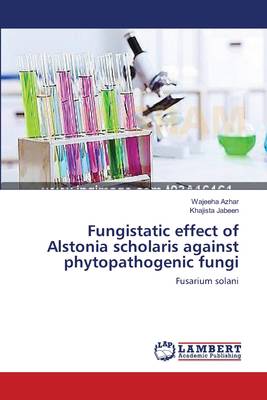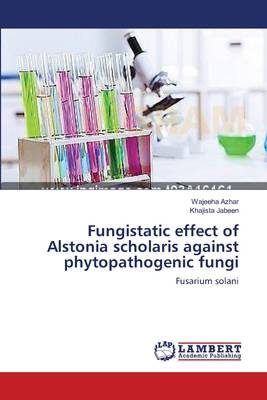
- Afhalen na 1 uur in een winkel met voorraad
- Gratis thuislevering in België vanaf € 30
- Ruim aanbod met 7 miljoen producten
- Afhalen na 1 uur in een winkel met voorraad
- Gratis thuislevering in België vanaf € 30
- Ruim aanbod met 7 miljoen producten
Zoeken
Fungistatic effect of Alstonia scholaris against phytopathogenic fungi
Fusarium solani
Wajeeha Azhar, Khajista Jabeen
Paperback | Engels
€ 47,95
+ 95 punten
Omschrijving
Plants are the most important part of the cycle of nature. All other life forms are directly or indirectly dependent upon plants. To control or mitigate plant diseases researchers are applying chemical fertilizers and pesticides. Such inputs to agriculture have contributed significantly to the spectacular improvements in crop productivity but at the same time playing a role as a pollutant for environment and human beings. Consequently, some pest management researchers have focused their efforts on developing alternative inputs to synthetic chemicals for controlling pests and diseases. Biological control of plant diseases is a long-term low-cost and non-detrimental to life. The development of biopesticides has been focused as a viable pest control strategy in recent years. Plant exudates, essential oils and extracts have potential antifungal activity against a wide range of fungi.Various kinds of alkaloids have been isolated from the leaves of A. scholaris. The present study was, therefore, carried out to explore the antifungal potential of organic solvent extracts of bark and leaves of Alstonia scholaris against one of the most phytopathogenic fungi Fusarium solani.
Specificaties
Betrokkenen
- Auteur(s):
- Uitgeverij:
Inhoud
- Aantal bladzijden:
- 60
- Taal:
- Engels
Eigenschappen
- Productcode (EAN):
- 9783659415234
- Verschijningsdatum:
- 19/06/2013
- Uitvoering:
- Paperback
- Afmetingen:
- 150 mm x 220 mm
- Gewicht:
- 100 g

Alleen bij Standaard Boekhandel
+ 95 punten op je klantenkaart van Standaard Boekhandel
Beoordelingen
We publiceren alleen reviews die voldoen aan de voorwaarden voor reviews. Bekijk onze voorwaarden voor reviews.








